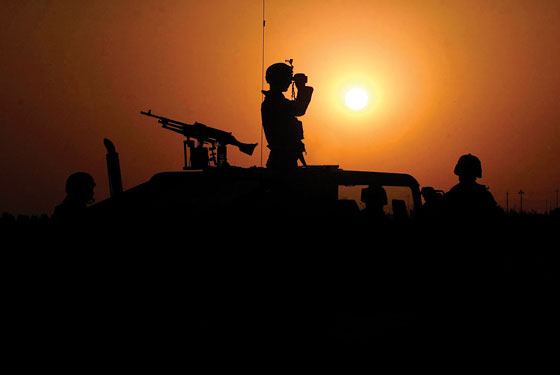
Like Nietzsche’s eternal recurrence and Freud’s return of the repressed, the war in Iraq keeps on coming back to bite us in the pineal gland. We do our best to distract ourselves with the collapse of the American economy or the rehab of pop tarts, but then another suicide bomb explodes in Baghdad and we are made to wonder once again—$3 trillion for exactly what? Bush’s War can’t tell us exactly “what,” except for a fiasco, but this two-night, four-and-a-half-hour Frontline special is the best audiovisual history of who, why, when, and how available to date. Since Frontline has been tracking the metastasis from 9/11 through to the surge, producer Michael Kirk had access to more than 40 previous stories to bolster a fresh batch of interviews. Not only do most of the principals speak for themselves, but because they often had to revise, improve, or repudiate earlier sound bites, they speak against themselves, too.
The effect can be oddly loopy, as if Jon Stewart’s Daily Show had hunkered down with YouTube to splice together a meta blooper reel. Except that nobody’s laughing, especially not the journalists who have been invited to perform as a kind of Greek chorus between the arias of, say, a Richard Armitage and a Pierre-Richard Prosper. It is of course impossible to say how much Jane Mayer of The New Yorker; Elizabeth Bumiller and James Risen of the New York Times; and Karen DeYoung, Dana Priest, and Bob Woodward of the Washington Post have been edited, but their remarks here, as we used to say of mainstream magazine articles in the sixties, manage mostly to make the obvious less obscure. One wonders where these sardonic scribblers were during the run-up to the war.
Probably because we are too familiar with the recent quagmire phase of the conflict—Sunnis and Shiites, Halliburton and insurgency, Bremer and Abu Ghraib—Bush’s War is most compelling in its first installment. From the moment of attack on the Twin Towers, Iraq was what the administration wanted its War on Terror to be about. As early as the afternoon of September 11, the president’s advisers cooked up a rhetorical formulation—equating “those who harbor” terrorists with the terrorists themselves—that would authorize targeting the neocon Beelzebub, Saddam Hussein. About Bush, David Frum admits, “I don’t know if he understood fully and foresaw fully the true radicalism of what he had just said.” But those around him did. And if Saddam is the magnetic pole toward which your compass needle invariably points, you will see aluminum tubes, Nigerien yellowcake, and germ warfare wherever you look. We could be watching Vantage Point, that Rashomon with training wheels, except that all the president’s men saw the same something that wasn’t there.
Underline the word men. Over and over in Bush’s War, we’re told that Rummy, Cheney, John Bolton, George Tenet, and John Yoo are “men’s men” and “alpha males.” Red-faced and beefy, they say so themselves. The vice-president and the secretary of Defense do their best to undermine the CIA, nobody talks to Condoleezza Rice, everybody lies to Colin Powell, and the State Department’s counterterrorism coordinator Cofer Black dreams of “heads on pikes … flies crawling across their dead eyes.” Nor are alpha males squeamish. From the Afghanistan wet dream of warlords on horseback to the Guantánamo nightmare of dog cages and waterboarding, they’ll do what it takes. If torture is a problem, get a memo from Gonzales. The president will sign anything.
Bush’s War
PBS. Monday, March 24, and Tuesday, March 25, at 9 p.m.